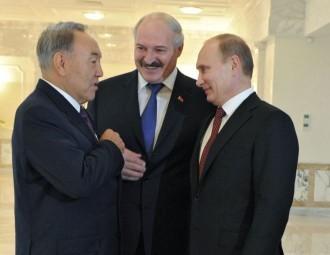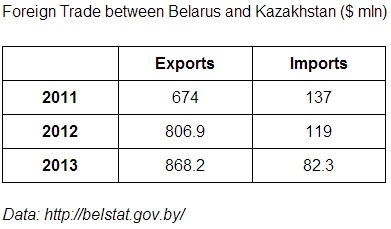Opinion: Unlike Kazakhstan, Belarusan authorities seem reluctant to make even minor cosmetic reforms

Due to Ukrainian conflict, Belarus and Kazakhstan have stumbled into a very similar geopolitical reality – authoritarian regime, and fear of outside interference in their internal affairs.
Unlike Lukashenka, Nazarbaev’s regime has been steadily strengthening the position of the Kazakh language and has made plans to switch over from its modified Cyrillic alphabet into using the Roman alphabet.
While the Kremlin has achieved its primary goal by launching the Eurasian Economic Union last month, the leaders of Belarus and Kazakhstan look unsatisfied.
Both want to slow down the integration project's progress down and prevent it from spilling over in the political arena.
However, Kazakhstan and Belarus lack common long-term goals, and their respective economic cooperation and any potential joint projects the might come up with would likely face obstacles as they try to get past Russia.
Though Belarus and Kazakhstan share the fear due to the Ukrainian crisis, Nazarbaev is in a better position to pull his together country. His policies have long aimed at strengthening national identity, appointing Western-educated professionals into senior positions and maintaining room for geopolitical manoeuvring. Belarus, it would seem, has quite a bit to learn from Kazakhstan.
Community of interest
On 29 May, the presidents of Belarus, Russia and Kazakhstan established the Eurasian Economic Union. Despite the fanfare surrounding the event, Nazarbaev and Lukashenka openly criticised the agreement a few days before the treaty's signing. The Belarusan head of state stated that this document differed from the one the parties had talked before.
As of late Belarus and Kazakhstan often appear to be in the same camp. Lukashenka and Nazarbaev both want to slow down the whole Eurasian integration project, or at least prevent it from going beyond economic agreement into real political integration.
Both leaders have criticised the idea of creating a Parliament of the Eurasian Economic Union being fully aware that this would politicise the union and would almost surely be dominated by Russia. Moreover, Belarus and Kazakhstan worry about their ties because of Russia's role in the ongoing Ukrainian conflict.
A growing number of voices from both countries criticizes Eurasian integration. For instance, new regulations for business, which would stifle both Belarusan and Kazakhstani businesses, remain of the most frequently discussed effects of Eurasian integration. An imminent increase on the amount one has to pay for duties on imported cars also raises concerns.
Many also expect unrestricted Russian dominance over the Eurasian Economic Commission, the new economic union's main governing body.
However, in spite of their converging interests, Belarus and Kazakhstan have yet to coordinate their foreign policies towards Russia. Although in public officials talk about steady increases in imports and exports between each other and the importance of their strategic partnership, they both lack any particular affection for one another.
Why countries cannot be partners?
Belarus and Kazakhstan distrust each other, in part, because they lack common long-term goals. They both became members of the Eurasian Economic Union primarily because of Russian pressure, not fruitful bilateral relations.
Their bilateral cooperation remains tiny considering their respective relations with Russia. In 2013, trade between Belarus and Russia appeared nearly 40 times greater than it was with Kazakhstan. In the case of Kazakhstan, it trades 30 times more with Russia than it does with Belarus. In the political and military arena, the proportions look even more significant.

For Kazakhstan, bilateral relations play an even smaller role, as it has rather small volume of exports that make their way to Belarus.
Moreover, the Eurasian Union for Kazakhstan and Belarus remains little more than a mean to extract economic benefits from Russia. In this regard they look more akin to competitors than allies.
Geographical distance became one of the most serious obstacles to build their mutual trade relations, although Russia plays its own role in hindering their cooperation. Belarus and Kazakhstan have been negotiating an increase of the transit of Kazakh oil through Belarus and even its processing.
Kazakhstan also remains interested in participating in the privatisation of Belarusan oil refineries, a role that is reserved for Russian business. In 2012 Kazakhstan's Ambassador to Belarus Ergali Bulegenov explained that not only would Belarus and Kazakhstan play a role in these negotiations, but Russia would as well.
Military-industrial cooperation can be named one of the successes of mutual relations. Belarus, for example, modernised 10 fighter jets for Kazakhstan, and as recently as the end of May more than 10Belarusan companies participated in armaments exhibition in Kazakhstan.
Today, both countries require the expertise of the other. Belarus has few, if any, real experts on Kazakhstan, although the country, at least formally, looks the second most important partner of Belarus after Russia.
Same challenges, different solutions
Due to the Ukrainian conflict, Belarus and Kazakhstan have inadvertently stumbled into a very similar geopolitical reality. Both nations remain authoritarian and afraid of outside interference in their internal affairs and realise possible cost of freeing themselves from Russia's grip.
Unlike Lukashenka, Nazarbaev’s regime has been steadily strengthening the position of the Kazakh language and has made plans to switch over from its modified Cyrillic alphabet into using the Roman alphabet.
He plans to elevate the Kazakh language extend beyond the nation's borders. On 28 April during his lecture at Moscow State University, the long-time Kazakh leader said that Eurasian Economic Union institutions should use the state languages of all its member countries in its operations.
The Kazakhstani authorities are increasingly appointing foreign university graduates, who have received training through the Bolashak scholarship program, to senior positions in the government. Around 10,000 Kazakhs have received higher education abroad, mostly in the U.S. and the UK, thanks to this program.
Certainly, Kazakhstan remains an authoritarian country, but the Belarusan authorities seem reluctant to make even minor cosmetic reforms.
Kazakhstan also has more space for geopolitical maneuvering. On the one hand, China has substantial energy interests in the country and can act as a kind of counterbalance to Russia's influence. On the other hand, the West holds Kazakhstan in high regard, unlike Lukashenka's Belarus. After the Crimean conflict erupted, Lukashenka held talks only with Polish PM Donald Tusk, while Nazarbaev spoke with Obama and Merkel.
Kazakhstan and Belarus find themselves precisely where their life-long leaders have led them. However, Nazarbaev looks much more determined to preserve the independence of his country by strengthening its national identity and bringing in young professionals to work for the state. Lukashenka might consider picking his counterpart's brain for a bit - before it is too late.
Originally published on BelarusDigest
-
03.01
-
07.10
-
22.09
-
17.08
-
12.08
-
30.09








































